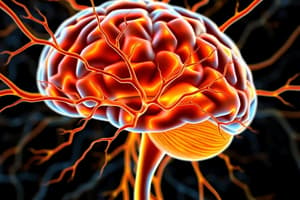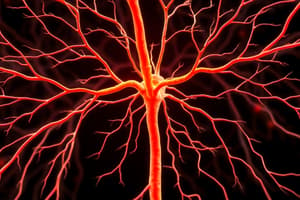Podcast
Questions and Answers
What area is located in the parietal lobe posterior to the central sulcus?
What area is located in the parietal lobe posterior to the central sulcus?
- Visual processing area
- Primary somatic sensory area (correct)
- Language comprehension area
- Primary motor area
Which part of the brain is responsible for receiving impulses related to pain, temperature, and light touch?
Which part of the brain is responsible for receiving impulses related to pain, temperature, and light touch?
- Postcentral gyrus (correct)
- Frontal lobe
- Occipital lobe
- Cerebellum
Which of the following lobes contains the primary somatic sensory area?
Which of the following lobes contains the primary somatic sensory area?
- Parietal lobe (correct)
- Occipital lobe
- Frontal lobe
- Temporal lobe
What term describes the deep indentations separating the gyri in the cerebral cortex?
What term describes the deep indentations separating the gyri in the cerebral cortex?
Which structure is located anterior to the central sulcus?
Which structure is located anterior to the central sulcus?
What type of matter primarily makes up the cerebral cortex?
What type of matter primarily makes up the cerebral cortex?
Which of the following accurately describes the location of the central sulcus?
Which of the following accurately describes the location of the central sulcus?
What area is located just before the postcentral gyrus?
What area is located just before the postcentral gyrus?
What is the primary function of the central nervous system?
What is the primary function of the central nervous system?
Which of the following best describes the structure of the peripheral nervous system?
Which of the following best describes the structure of the peripheral nervous system?
What type of fibers do the sensory (afferent) division of the nervous system use?
What type of fibers do the sensory (afferent) division of the nervous system use?
What is the primary role of the somatic nervous system?
What is the primary role of the somatic nervous system?
Which subdivision of the motor (efferent) division is responsible for involuntary actions?
Which subdivision of the motor (efferent) division is responsible for involuntary actions?
Which of the following accurately describes cranial nerves?
Which of the following accurately describes cranial nerves?
Which component of the nervous system interprets incoming sensory information?
Which component of the nervous system interprets incoming sensory information?
What is the main difference between the sympathetic and parasympathetic nervous systems?
What is the main difference between the sympathetic and parasympathetic nervous systems?
What structure surrounds each individual nerve fiber?
What structure surrounds each individual nerve fiber?
Which type of nerve carries impulses toward the CNS?
Which type of nerve carries impulses toward the CNS?
Which of the following cranial nerves is sensory only?
Which of the following cranial nerves is sensory only?
What is the primary component of mixed nerves?
What is the primary component of mixed nerves?
What structure binds groups of fascicles together to form a nerve?
What structure binds groups of fascicles together to form a nerve?
What is the primary role of the hypothalamus?
What is the primary role of the hypothalamus?
Which gland is housed within the epithalamus?
Which gland is housed within the epithalamus?
What fluid is formed by the choroid plexus located in the epithalamus?
What fluid is formed by the choroid plexus located in the epithalamus?
Which structure is considered part of the brain stem?
Which structure is considered part of the brain stem?
Which function is NOT associated with the hypothalamus?
Which function is NOT associated with the hypothalamus?
What is the primary function of the mammillary bodies?
What is the primary function of the mammillary bodies?
Which part of the diencephalon is involved in regulating the pituitary gland?
Which part of the diencephalon is involved in regulating the pituitary gland?
Which of the following structures does NOT directly form part of the brain stem?
Which of the following structures does NOT directly form part of the brain stem?
What role does the diencephalon play in the autonomic nervous system?
What role does the diencephalon play in the autonomic nervous system?
Which ventricle is enclosed by the thalamus?
Which ventricle is enclosed by the thalamus?
Which nerve is primarily responsible for the sensation of the skin over the anterior thigh?
Which nerve is primarily responsible for the sensation of the skin over the anterior thigh?
Which of the following nerves does NOT arise from the lumbar plexus?
Which of the following nerves does NOT arise from the lumbar plexus?
What is the function of the superior gluteal nerve?
What is the function of the superior gluteal nerve?
Which nerve is involved in the sensory innervation of the skin on the posterior aspect of the thigh?
Which nerve is involved in the sensory innervation of the skin on the posterior aspect of the thigh?
Which nerve branches into the deep fibular and superficial fibular nerves?
Which nerve branches into the deep fibular and superficial fibular nerves?
Which structure is NOT part of the sacral plexus?
Which structure is NOT part of the sacral plexus?
What is the main function of the saphenous nerve?
What is the main function of the saphenous nerve?
Which of the following nerves is responsible for the motor innervation of the gluteus maximus muscle?
Which of the following nerves is responsible for the motor innervation of the gluteus maximus muscle?
Flashcards are hidden until you start studying
Study Notes
Nervous System: Structural Classification
- The Central Nervous System (CNS) is composed of the brain and spinal cord, acting as the body's control center.
- The Peripheral Nervous System (PNS) consists of nerves extending from the CNS, connecting it to the rest of the body.
- Spinal nerves carry impulses to and from the spinal cord.
- Cranial nerves carry impulses to and from the brain.
Nervous System: Functional Classification
- The Sensory (afferent) division carries information to the CNS.
- Somatic sensory fibers transmit information from skin, skeletal muscles, and joints.
- Visceral sensory fibers carry information from internal organs.
- The Motor (efferent) division carries impulses away from the CNS to effector organs.
- Somatic nervous system controls skeletal muscles voluntarily (consciously).
- Autonomic nervous system controls smooth and cardiac muscles, and glands involuntarily (automatically).
- Further divided into the sympathetic and parasympathetic nervous systems.
Functional Anatomy of the Brain
- Cerebral cortex is located in the cerebrum.
- The primary somatic sensory area in the parietal lobe receives impulses from sensory receptors throughout the body, except for special senses.
- Diencephalon is a part of the forebrain.
- Hypothalamus regulates body temperature, water balance, metabolism, emotions (through the limbic center), and the pituitary gland.
- Epithalamus comprises the roof of the third ventricle and includes the pineal gland (endocrine gland) and the choroid plexus, which produces cerebrospinal fluid.
- Brain stem connects the brain to the spinal cord.
- Midbrain, Pons, and Medulla oblongata are the three parts of the brain stem.
Structure of a Nerve
- Nerves are bundles of neurons outside the CNS.
- Surrounded by connective tissue sheaths:
- Endoneurium wraps individual fibers.
- Perineurium binds groups of fibers into fascicles.
- Epineurium binds fascicles together.
- Surrounded by connective tissue sheaths:
Types of Nerves
- Mixed nerves contain sensory and motor fibers.
- Sensory (afferent) nerves carry impulses toward the CNS.
- Motor (efferent) nerves carry impulses away from the CNS.
Cranial Nerves
- There are 12 pairs of cranial nerves mainly serving the head and neck.
- Only the vagus nerves extend to the thoracic and abdominal cavities.
- Most are mixed nerves, but three are sensory only:
- Optic
- Olfactory
- Vestibulocochlear
Spinal Nerve Plexuses
- Cervical plexus serves the head, neck, and shoulders.
- Brachial plexus serves the shoulder, arm, forearm, and hand.
- Lumbar plexus serves muscles and skin of the thigh, leg, and foot.
- Sacral plexus serves the muscles and skin of the lower limb, including the posterior thigh, leg, and foot.
- Coccygeal plexus serves a small area around the coccyx.
Studying That Suits You
Use AI to generate personalized quizzes and flashcards to suit your learning preferences.




